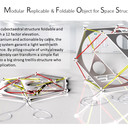
You need to log in or sign up before continuing.

In first place is "Interface and Integration of Tesseract". The submitter did an excellent job in explaining how the new functional modules worked for data/gas/electrical/fluid transfer. Images show how the modules are affixed together. Entry indicates that there are realistic failure points if modules are not aligned properly or sealed, but that is something an engineering team would work on to make the system design more robust before being flight-ready. Overall, great entry!

In the category of "Outfitting - Routing/Connections", the first-place winner is "MSP&C". This submission is by far the highest fidelity and thought-out concept. The submitter provided detailed description of the modular piping concept for fluid/gas transfer and cable routing, interfaces for the system, and even incorporated a pipe robot for that moves through the structure to perform joining tasks. The submission provided very clear explanation and diagrams to explain their concept and went into details beyond what was expected.
The reviewers appreciated the tendon driven worm robot mechanisms and thought it would be worth a kinematic formulation. Many of the details are feasible for a functioning prototype.
Their development of the fundamental pipe components simple and elegant. Overall, they really understood the spirit of the challenge and went above and beyond in their design and submission.

n the category of Mission Design, the first-place winner is "MORFOS²". MORFOS² is a well thought out deployable unit cell design that has many detailed designs and images to illustrate the concept. They did a good job applying their design for various mission applications such as towers, booms, and telescope structure. The unit cell to unit cell joint could have been described in more detail. Really intriguing and beautiful design.

In second place is the "Assembly and Outfitting" team. This submission did very well in explaining their concept and providing details of how connections, operations, packing, and many other details of how their system would work. There was detailed analysis and FEA done to show the performance of the individual strut members. The submission had a nice mix of custom and COTS component, which would help cut down on development costs. Overall, a very solid submission.

In second place is the "Interflow" team. This submission is a well thought out concept that shows how components could be added to increase the functionality of the ARMADAS architecture. The reviewers liked how the approach did not require adding components to every voxel, which reduced the number of needed components. Detailed benefits and cons of the connection system was discussed, and they articulated why they came to this design.

In second place is the "Modular Pipes and Assembly Robots for ARAMDAS" team. This team did a great job in illustrating their concept along with clear documentation in describing how the system worked. They were able to leverage the existing work and built of the existing design to add more capability and functionality. A custom fastener was even adopted to enable structural connections. Very well done.

The first honorable mention goes to the "Autonomous Modular Water Recycling & Agriculture Concept Design for NASA Space Missions Robotics Assembly & Outfitting Challenge" submission for Multi-functionality, multi-application, wild ideas! The reviewers liked that this submission used different scales of voxels to create different elements in his structures. Small ones to help make staircases, large ones for the individual habitat modules, medium ones for building up the struts of the interior, etc. The submitter indicates that the design is not necessarily practical, but I appreciate the imagination of the design for the facilities/habitats. This submission captured the long-term idea of how the challengers envisioned applying the technology, but the description lacks a lot of information with respect to analysis for the design and how it improves on existing technologies/capabilities, some things need to be inferred based on the images alone.

The MSP&C submission deserves an additional honorable mention award for going above and beyond in their submission as well as recognizing the professor for incorporating the challenge into his classes and encouraging so many new ideas.


If you don't receive the email within an hour (and you've checked your Spam folder), email us as confirmation@grabcad.com